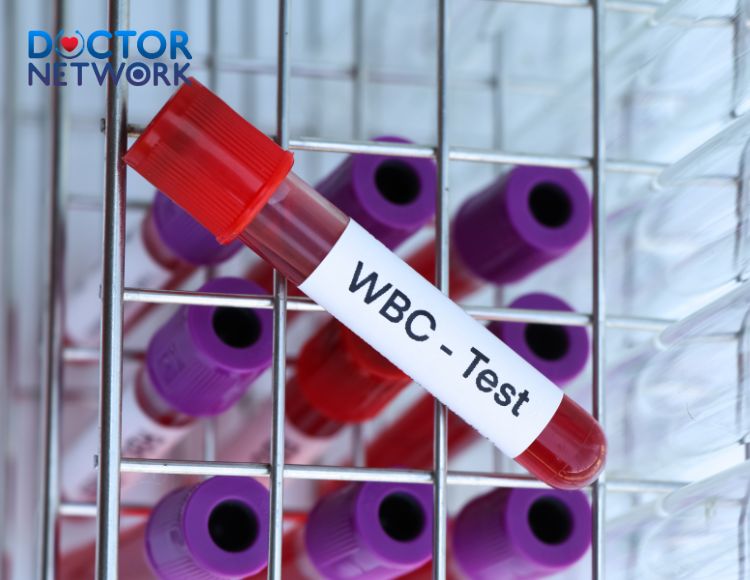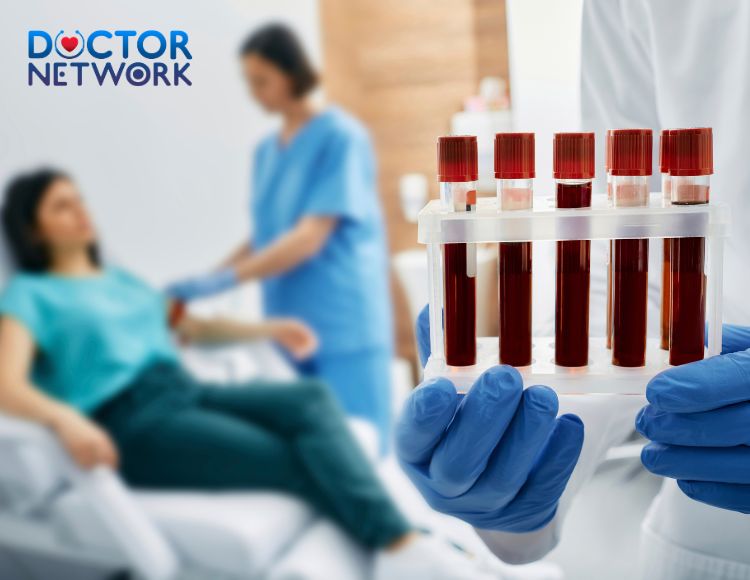WBC, short for White Blood Cells, is a crucial component of the immune system. A blood test evaluating the WBC count is a common tool to detect potential issues in the body. So, what is WBC in a blood test?
WBC – The Body’s Protector
What are white blood cells? These are immune cells circulating in the blood, originating from the bone marrow, tasked with destroying invading bacteria and viruses, as well as cleaning up dead cells and cellular debris.
Types of White Blood Cells
- Neutrophils: The most abundant, serving as the first line of defense.
- Lymphocytes: Recognize, remember, and attack specific pathogens.
- Other Types (monocytes, eosinophils, basophils): Participate in allergic reactions, parasitic immunity, etc.
WBC Count: When to Test, Normal Levels
What is WBC in a blood test? When is a WBC test needed? This test is usually part of a complete blood count (CBC) and is indicated when there is suspicion of infection, inflammation, blood disorders, or allergies.
Normal WBC Levels
- Adults: Approximately 4,000 – 10,000 WBCs per microliter of blood.
- Children, Pregnant Women, etc.: Values vary depending on age and condition.

What is WBC in a blood test? The test is usually part of a complete blood count (CBC).
Interpreting WBC Test Results
What is WBC in a blood test? – High WBC (leukocytosis):
- Infections (bacteria, viruses, parasites)
- Inflammation (pneumonia, arthritis)
- Bone marrow issues (leukemia)
- Severe allergies or drug side effects

What is WBC in a blood test? – High WBC can indicate infection
What is WBC in a blood test? – Low WBC (leukopenia):
- Due to viruses (flu, HIV)
- Bone marrow disorders
- Autoimmune disorders
- Chemotherapy, radiation therapy

What is WBC in a blood test? – Low WBC can be due to viruses (flu, HIV)
Notes on Interpreting WBC Test Results
What is WBC in a blood test? – Do not self-diagnose based on WBC test results. A doctor will assess the condition based on total WBC count, the ratio of different types of white blood cells, symptoms, and accompanying tests.
Frequently Asked Questions about “what is WBC in a blood test”
Here are five questions related to “What is WBC in a blood test“:
- Besides infections, what else can high WBC indicate?
- Besides infections, high WBC can occur in:
- Inflammatory diseases: Rheumatoid arthritis, inflammatory bowel disease
- Bone marrow disorders: Leukemia, myeloproliferative disorders
- Severe allergic reactions or side effects from certain medications (corticosteroids)
- Important: Combine with the ratio of different types of white blood cells, accompanying symptoms, and other tests for an accurate diagnosis.
- Besides infections, high WBC can occur in:
- How low does WBC have to be to be dangerous?
- There is no absolute number. Low WBC (leukopenia) needs to be evaluated based on the cause:
- Certain viral infections (flu, measles) can temporarily reduce WBC.
- Severe, prolonged leukopenia from bone marrow diseases, immune deficiency increases the risk of serious infections.
- Always consult a doctor for accurate interpretation of WBC test results in your case.
- There is no absolute number. Low WBC (leukopenia) needs to be evaluated based on the cause:
- Which foods help increase WBC?
- No food has been proven to directly increase WBC. However, boosting immunity helps maintain healthy white blood cells:
- Fruits and vegetables rich in vitamin C, antioxidants
- Zinc-rich foods: Red meat, shellfish
- Balanced, diverse diet enhances overall health.
- No food has been proven to directly increase WBC. However, boosting immunity helps maintain healthy white blood cells:
- Can WBC levels change daily?
- Yes. WBC levels can fluctuate slightly due to various factors:
- Stress, intense exercise
- Menstrual cycle
- Medications
- Therefore, evaluating WBC requires considering other factors and the overall health condition.
- Yes. WBC levels can fluctuate slightly due to various factors:
- What is the relationship between WBC and platelets?
- WBC (white blood cells) and platelets are both components of blood, playing vital roles in immunity and clotting.
- Some conditions can affect both WBC and platelets (e.g., leukemia, bone marrow diseases).
- Tests like WBC count, complete blood count (CBC), and platelet count are often evaluated together.
Scientific Evidence Related to “What is WBC in a Blood Test”
Here are some scientific references related to “What is WBC in a blood test“:
- Role of White Blood Cells (WBC) in the Immune System:
- White blood cells are essential to the immune system, protecting the body against bacteria, viruses, fungi, and other harmful agents.
- Scientific studies have shown that white blood cells play crucial roles in:
- Detecting and destroying microorganisms: White blood cells can identify and eliminate pathogens through various mechanisms, including phagocytosis, secretion of toxic substances, and activating other immune cells.
- Reducing inflammation: White blood cells help control infections, aiding in quick recovery after damage.
- Preventing cancer: Some white blood cells can destroy cancer cells and inhibit tumor growth.
- Significance of WBC Test in Diagnosing Diseases:
- What is WBC in a blood test? WBC tests are a crucial diagnostic tool for assessing overall health and detecting various conditions, including:
- Infections: Changes in WBC count can indicate bacterial, viral, or parasitic infections.
- Inflammation: Acute or chronic inflammation is often accompanied by changes in the number and ratio of different types of white blood cells.
- Blood disorders: Conditions like leukemia, anemia, and immune deficiencies can affect the number and function of white blood cells.
- Allergies: Severe allergic reactions can lead to a temporary increase in white blood cells.
- What is WBC in a blood test? WBC tests are a crucial diagnostic tool for assessing overall health and detecting various conditions, including:
- Normal WBC Levels by Age and Gender:
- Normal WBC levels can vary by age and gender. Consult a doctor for detailed information on normal WBC levels for specific cases.
Note:
- The information in this article is for reference only.
- Always consult a doctor for accurate advice and diagnosis.
Understanding “What is WBC in a blood test” helps in early detection of many health issues. However, always seek medical examination and interpretation of WBC results from healthcare professionals for the most appropriate monitoring and treatment plans.
References:
https://www.ucsfhealth.org/medical-tests/wbc-count
https://ada.com/white-blood-cell-count/
https://www.roswellpark.org/cancertalk/202311/types-white-blood-cells-what-numbers-may-mean
Kiểm Duyệt Nội Dung
More than 10 years of marketing communications experience in the medical and health field.
Successfully deployed marketing communication activities, content development and social networking channels for hospital partners, clinics, doctors and medical professionals across the country.
More than 6 years of experience in organizing and producing leading prestigious medical programs in Vietnam, in collaboration with Ho Chi Minh City Television (HTV). Typical programs include Nhật Ký Blouse Trắng, Bác Sĩ Nói Gì, Alo Bác Sĩ Nghe, Nhật Ký Hạnh Phúc, Vui Khỏe Cùng Con, Bác Sỹ Mẹ, v.v.
Comprehensive cooperation with hundreds of hospitals and clinics, thousands of doctors and medical experts to join hands in building a medical content and service platform on the Doctor Network application.

























